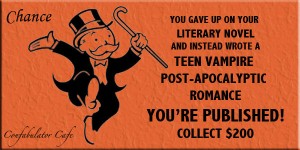It took me a while to work out where I was going with this topic, because I can’t think of a lot of advice I’ve gotten from other writers, and none of it personal. After covering two bits of good not-quite-advice, I finally found the advice that I couldn’t step away from: “Don’t sweat the bad reviews.”
It’s not bad advice. I agree in principle, but it’s over-simplified. I think over-simplified is bad. I think over-simplified leads to professional writers who don’t read their own reviews at all and can’t see the difference between “The quality of this series has decreased,” and “Bad reviewers are just sexually frustrated haters.”
You can’t please everyone, but there’s a big difference between someone leaving a review because they weren’t your target audience1, someone leaving bad reviews because they sort of hate you personally, and someone leaving a review because they’re pointing out what they feel to be genuine problems in the work.
I don’t believe, at any spectrum of success, that an author should agonize and dwell on bad reviews. That said, I do believe in taking the bad with the good — and sometimes the bad is a reviewer calling you a hack. So, generally, I feel like this advice would be better stated as, “Consider what the bad review is saying, and make your own judgement.”
In my favorite form lately: personal anecdote time!
(more…)



